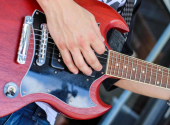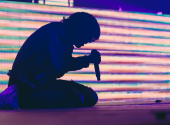
TOP 5 Drunken Escapades of Musicians
A few weeks ago, you may have noticed the much-criticised version of the American anthem by singer Ingrid Andress performing at the opening of the Major League Baseball Home Run Derby tournament in Texas, USA. Many people even called it one of the worst live versions of the anthem at a large professional sporting event. The thirty-two-year-old country singer then announced on social media that she was drunk and would enter rehab immediately. Alcohol has always been a part of the music business and many musicians have succumbed to its demonic influence. Those who did not, on the other hand, are now in the halls of fame and reminiscing wild parties full of sex, drugs and rock'n'roll. Pour yourself a glass of something strong, as the TOP 5 drunken escapades of musicians await you.
1. Slash's failure in "Welcome to the Jungle"
Guns N' Roses emerged on the scene with a reputation as the most dangerous band in the world, backed by an incredible amount of drugs and alcohol consumed. I recommend reading either the autobiography by the Master Slash or by bassist Duff McKagan. Considering that they routinely worked on hectolitres of vodka, whiskey and beer interspersed with appropriate portions of cocaine and who knows what else, it's no wonder that at one of their 1991 shows, guitarist Slash tries in vain to play the famous intro to the hit "Welcome to the Jungle". |Moreover, Axl Rose epically introduces the song by saying: "Do you know where you are? Do you know where you are? All I know is when I was here and I was seventeen, I was in the middle of the f***ing jungle." But Slash clearly had trouble realizing not only where he was, but what he was playing. These scenes happened quite often also to other band members, i.e. with bassist Duff McKagan describing how he felt he couldn't continue anymore while playing. He was not all there rhythmically and couldn't even hit the strings. But after this episode, he pulled himself together and embarked on a rigorous detox. He is now in great shape and regularly airs his mountain bike on challenging multi-kilometre trails.
2. Eddie Van Halen on tour in 2004
Eddie Van Halen's problems with alcohol and substance abuse culminated during a reunion tour with Sammy Hagar in 2004, which became an infamous disastrous chapter in Van Halen's history. The tour was marred by Eddie Van Halen's anti-social behaviour that bordered on lunacy. Hagar, for example, described a scene where Eddie used an empty wine bottle to try to break the windows of their plane, which was in full operation several thousand feet above the ground. The irony was that moreover the aircraft was rented. The tension between Hagar and the Van Halen brothers was palpable, as Hagar also insisted on having bassist Michael Anthony on the tour. In the end, Anthony joined them but lost a significant portion of his fee. The fateful 2004 tour ended after Eddie smashed his guitar onstage, reportedly burst into tears and told the audience, "You don't understand."
3. Creed fans' lawsuit in 2002
Have you ever been to a concert that fell so short of your expectations that you seriously considered refunding your ticket? The 2002 Creed concert in Chicago falls into that category. It was so bad that fans sued the band members for damaging the experience. The lawsuit claimed that lead singer Scott Stapp was "so intoxicated and/or medicated" that he was unable to sing normally. "Stapp left the stage on several occasions during songs for long periods of time, rolled around on the floor of the stage in apparent pain or distress, and appeared to pass out while on stage during the performance," the lawsuit claimed. The band made a statement apologizing for the performance, but at the same time, lead singer Scott Stapp tried to portray his onstage actions as an emotional, over-the-top performance, where he wanted to convey to fans as much of the painful experiences he was going through at the time as possible. Fortunately for the band, the judge eventually dismissed the lawsuit, saying that they could have easily played just one note. Fans are only paying to enter the venue and cannot expect a specific "musical performance" and some sort of compensation if their expectations are not met. (source: @rnrtruestories)
4. Beach Boys were more like Beer Boys
Carl Dean Wilson was an American musician and co-founder of the Beach Boys. In addition to being their lead guitarist, the youngest sibling of bandmates Brian and Dennis, he became the de facto leader of the group from the early to mid-1970s. Wilson first held the role of solo guitarist and backing vocalist in the band but sang lead vocals on several later hits, including "God Only Knows" (1966), "Good Vibrations" (1966), "I Can Hear Music" (1969) and "Kokomo" (1988). It was during a 1978 performance of the "Good Vibrations" that he apparently went slightly overboard with the booster shots backstage, stammered out the lyrics in his drunken stupor, and somehow lost track of the key during his signature solo. Not long after that, in the early '80s, the Beach Boys found themselves in disarray. The group split into two groups. Wilson, frustrated by the slow recording of new material and a reluctance to rehearse, embarked on a solo career in 1981.
5. When you're banned from television – The Replacements in 1986
When you manage to get prime airtime on the popular American show Saturday Night Live, it means you've made it. However, alternative rock band The Replacements earned themselves a ban from SNL in 1986 (RATM and Elvis Costello did the same, by the way) and cemented their reputation as one of the most unpredictable touring bands in history. The story goes that the band members, especially guitarist Bob Stinson, had been drinking all day and by the time of the live show were already "stoned". During the performance, lead singer Paul Westerberg would fail his vocals and at times nonchalantly walk away from the microphone or just wander around the stage. At one point he turned to Stinson and said: "Come on, f*ck!", then at the end of the song the bare bottom of one of the band members appeared for a moment. The band then capped it all off with a big party, trashing the hotel rooms that SNL was paying for. The show's producer Lorne Michaels took it personally and told the band that they would never play SNL again.
If you have found an error or typo in the article, please let us know by e-mail info@insounder.org.





